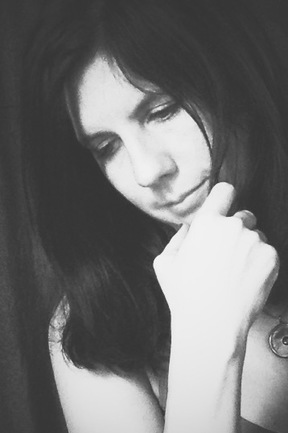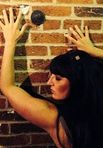Carpe Noctem Book Interview With Christina Veladota
 Aldrich Press (an imprint of Kelsay Books), 2016 THINGS WE’RE DYING TO KNOW…
Aldrich Press (an imprint of Kelsay Books), 2016 THINGS WE’RE DYING TO KNOW…Let’s start with the book’s title and your cover image. How did you choose each? And, if I asked you to describe or sum up your book, what three words immediately come to mind?
The title Clutch & Brood comes from my obsessing over some house finches that took up residence on my carport the summer I wrote most of this chapbook. I began thinking about these two words in relation to birds and also in relation to family. The multiple meanings of clutch and brood seemed to open up the central themes and images in the book.
Photography is a hobby of mine, so I shot the cover for this book, as I did for my first chapbook, The Girl & Her Lions (Finishing Line Press, 2010). My daughter, Sophie, is the girl in the image. Since the concept of family is important for this book, I thought it appropriate that Sophie appear as the bird that holds the empty nest for the reader to consider.
The three words that come to mind to describe this book are haunting, intimate, and… well… brooding.
What were you trying to achieve with your chapbook/book? Tell us about the world you were trying to create, and who lives in it.
My mother died of Alzheimer’s a few years ago. If you’ve been through this with a loved one, then you know how it feels to “lose” the person before she is actually gone. The truth is that as we lost her, she also lost us. She was living in a time before my sisters and I existed. She was a child, still living in her father’s house. She was, in a way, haunting her own past.
Clutch & Brood, a collection of prose poems, explores how memory, even for those of us without any type of dementia, can be a kind of haunting. The poems are inspired by lived experience, but I wouldn’t say they are autobiographical, per se. They focus on the concepts of family and of memory and memory loss.
Can you describe your writing practice or process for this collection? Do you have a favorite revision strategy?
My process involves a lot of reading and napping, which makes me sound incredibly lazy, I know, but catnaps do often help me find the poem I’m trying to write. While working on this particular collection, I wrote notes and early drafts while sitting outside and took breaks to work in my garden. I was fully committed to the process but also unwilling to force anything onto the page.
I intentionally repeated images, words, and phrases among the poems, so they would seem in conversation with one another. My hope was that the reader would experience this in much the same way we experience memory, when something familiar is re-imagined in a new context.
The drafting stage is always full of inspiration and creative adrenaline, and I love that feeling of losing time because I’m so immersed in what I’m writing. Revision requires me to come back to reality and see with new eyes what I’ve put on the page. I approach revision as I would a puzzle. What words, images, or “pieces” are necessary (or unnecessary) to help complete this poem? Though I enjoy revision, it can also be the most frustrating aspect of writing, particularly when I realize (as I often do) that the poem isn’t going to work in its current form.
How did you order the poems in the collection? Do you have a specific method for arranging your poems or is it sort of haphazard, like you lay the pages out on the floor and see what order you pick them back up in?
I actually did lay the pages on the floor at one point. I also taped them to the side of my bookcase for a spell. My method of organization wasn’t haphazard, but it wasn’t an exact science, either. I wasn’t looking for a narrative arc, more an arc of ideas, so the images would unfold in a meaningful way for the reader.
What do you love to find in a poem you read, or love to craft into a poem you’re writing?
I love reading a collection and finding a poem so amazing I have to close the book and set it aside for a few hours; a poem that compels me to close my eyes and sit in silence, so for a few moments, I can continue to live inside its world.
Can you share an excerpt from your book? And tell us why you chose this poem for us to read – did it galvanize the writing of the rest of the collection? Is it your book’s heart? Is it the first or last poem you wrote for the book?
When I was a child, my family spent time every summer in a tiny cabin on Three Mile Harbor in East Hampton, NY. I’ve often mused over the idea that we’re still there, haunting the place, and if I were to return, I’d see or sense the ghost of my child-self running through woods and down to the beach. The following is the penultimate poem in the book, and it addresses the concept of memory as a type of haunting. This recently appeared in The Laurel Review’s special issue dedicated to the prose poem.
If I were to Haunt You, I’d keep it to Myself
We already know we’re ghosts, but who among us will admit it? Our father sweeps the sea of its oysters while we play jellyfish roulette, diaphanous bullets in their chamber. The horseshoe crabs are armored knights retreating from the joust; we place our bets against them, go with the mussels, their open mouths so many razors threatening our skin. Evenings our mother gives us flashlights, but we call them fire & char the night with our names. The moon is the least of our worries; it is already a perfect cigarette burn among ashes. We say no to the stone that calls itself planchette, but can’t ignore its séance. Cicadas radio their tympani to the owls, glooming the trees. You are the last red song in the haunt of my eyes. Our candles gutter little birds that startle the sky.
If you had to convince someone walking by you in the park to read your book right then and there, what would you say?
Um… Here’s five bucks?
For you, what is it to be a poet? What scares you most about being a writer? Gives you the most pleasure?
Writing poetry is challenging – I wouldn’t want to do it if it were easy – but I end up having a love/hate relationship with it sometimes, particularly when I struggle with a project or find myself adding to my collection of rejections. I knew at the age of nine that I would be a writer, and I have never waivered from this path. Writing, for me, isn’t a choice; it’s just who I am. So even when I “hate” writing, I don’t know what I’d do without it.
Are there other types of writing (dictionaries, romance novels, comics, science textbooks, etc.) that help you to write poetry?
When it comes to inspiration, I take it where I can get it. One of the poems in my first chapbook was inspired by the prophecies of Nostradomus. I’ve even been inspired by stories from the news and odd syntax found in weather reports. I read just about anything I can get my hands on.
One of the books I’m reading now is Susan Sontag’s On Photography; I’m intrigued by her discussion of Diane Arbus and her choice of and approach to her subjects. Sontag also quotes Nietzsche as having said, “To experience a thing as beautiful means: to experience it necessarily wrong.” I love that.
What are you working on now?
I’m working on a full-length collection that continues to explore memory and the family.
What book are you reading that we should also be reading?
Mary Karr’s The Art of Memoir. You should read it, too.
Without stopping to think, write a list of five poets whose work you would tattoo on your body, or at least write in permanent marker on your clothing, to take with you at all times.
Emily Dickinson, Mary Ruefle, Anne Sexton… and I’m going to cheat a little here and say Gabriel Garcia Marquez and Flannery O’Connor, because their prose is so beautifully poetic.
***
Purchase Clutch & Brood here.
 Christina Veladota’s poetry has appeared or is forthcoming in a number of literary journals, including The Laurel Review, Hotel Amerika, The Journal, Bellingham Review, and Mid-American Review. The author of the chapbook The Girl & Her Lions (Finishing Line Press, 2010), she currently serves as an associate professor of English Composition & Literature at Washington State Community College in Marietta, OH. She is a recipient of a 2014 Individual Excellence Award from the Ohio Arts Council. Visit her online at: www.christinaveladotapoetry.com.
Christina Veladota’s poetry has appeared or is forthcoming in a number of literary journals, including The Laurel Review, Hotel Amerika, The Journal, Bellingham Review, and Mid-American Review. The author of the chapbook The Girl & Her Lions (Finishing Line Press, 2010), she currently serves as an associate professor of English Composition & Literature at Washington State Community College in Marietta, OH. She is a recipient of a 2014 Individual Excellence Award from the Ohio Arts Council. Visit her online at: www.christinaveladotapoetry.com.
Published on April 12, 2016 06:07
No comments have been added yet.



